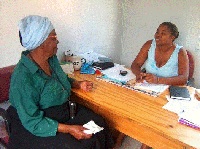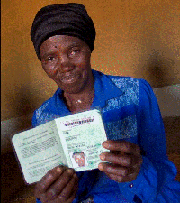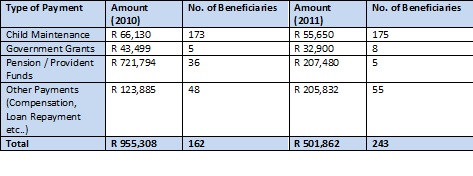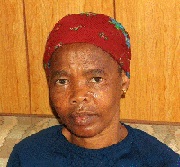Background
This was the second most common type of problem in 2011, making up 31% and 1771 of cases. They include advice on obtaining ID documents, birth and marriage certificates, government grants, pensions, insurance payments, funeral policies, money from loans and stockvel investment schemes, Motor Vehicle Fund Claims and inheritances. In 2010, R965,000 was collected by coordinators in these payments.
Pension payouts account for most of the most money: coordinators have become extremely competent at dealing with fund administrators, often based on scanty scraps of information provided by clients. The service provided by the coordinators of phoning again and again to locate the correct officials, monitor the claim, and keep clients informed is invaluable in securing money on behalf of semi-literate people.
(Left) Coordinator Fisani Ngcobo helps a client
Coordinators help clients to fill out forms and obtain documents such as ID’s and birth certificates when applying for grants such as child support, foster care, care dependency and disability grants. Many clients come to a support centre with a separate problem and learn that they qualify for a grant that they were not aware of.
Coordinators investigate cases where a client applies for a grant and experiences a delay, in some cases two years and more, working with the Department of Social Development. They also investigate cases of individuals fraudulently claiming grants on behalf of others.
Successful claims bring money directly into the hands of families and into the local economy. There is no measure equal to this in alleviating poverty. Money goes to basic needs, and also to providing for the future. Case studies show that money from payouts means a youngster who can embark on a training course, a woman who can build her own shelter, or start a Spaza shop.
The coordinators have previously succeeded in obtaining identity documents (ID’s) and birth certificates for community members within a very short time - about 3 weeks - by inviting officials from Home Affairs to their support centres to assist people.
The table opposite summarises the payments secured for clients in the last two years: 
Thabisile Miya, Nov 2007:
Reinstatement of a Disability Grant
A 33 year old woman who has been the recipient of a disability grant approached our office because the grant had lapsed in 2007, the exact date unknown. She applied for review, but no payment has been received.
I telephoned the Head Office of the Department of Social Welfare to query the non-payment. They told me that the grant would be reinstated immediately and that payment has been approved for November 2007. The amount is R1749.00.
Nokuthula Mchunu, Mar-April 2008:
(Below) Coordinator Sibongile Mchunu helped a client obtain a wheelchair 
Recovery of Pension of Client’s Husband
A 58 year old woman, whose husband passed away while he was a government employee, applied for a pension from the Pensions Department in Pretoria. The pension lapsed because of an attestation of life that had to be filled in. She went to Pietermaritzburg where there is an office that promised to assist her. It was posted to Pretoria but she received no payments for 6 months. She went back to that office and they told her that everything had been done. She did not know what to do until she spoke to a community member who referred her to us.
I phoned the Pensions Department in Pretoria and they said that they had the certificate but no copy of her ID. I posted a copy of her ID and advised her to report to me if there was a further problem. She came to the office on 8 April 2008 and expressed her appreciation because she had received the amount of R5025.15.
“I had lost trust in people, especially social workers, as nothing came out of the promises. I also thought the coordinator’s promise was as empty as the other ones. I was surprised when she brought me a wheelchair within a short period of time. Had I known, I wouldn’t have struggled for such a long time.” - Respondent, 2007 Evaluation |
Nokuthula Mchunu, Aug 2008:
Long Battle for a Client’s Pension
A 58 year old man’s wife passed away in May 2007. She had been working as a nurse and he lodged a claim for a government pension. He only received R7500 for funeral benefits. He then visited human resources at the clinic where she had worked. They told him the claim was in progress. Due to the long delay he came to the CCJ support centre after a relative referred him to us.

(Left) Coordinator Patricia Maphanga
I phoned the government pension department in Pretoria (GEPF); they said they had received the documents but that the bank statements and the copies of the ID of the claimant and his son were missing. They issued the documents to Pholela Clinic and I posted the others to the clinic.
After a few weeks I checked with the GEPF and they said they had received everything but the file had been sent back to Pholela Clinic where the Z102 form had to be filled in. In April 2008, a month later, I phoned the GEPF. They said they were still waiting for the file from Pholela Clinic. When I phoned the clinic they said they were still waiting for the file.
 In May 2008 the claimant reported that the clinic had phoned him and asked him to start a new file because the delay showed that the file may somehow have been lost. The client was worried about the cost of transport but I encouraged him to go because they promised to provide him with transport.
In May 2008 the claimant reported that the clinic had phoned him and asked him to start a new file because the delay showed that the file may somehow have been lost. The client was worried about the cost of transport but I encouraged him to go because they promised to provide him with transport.
A few weeks later I phoned the GEPF and they said that the new file had been compiled and that they were still working on the file. After that I phoned every 3 weeks. The client reported that he was having trouble paying for transport for his child to go to school; he was struggling to pay for food and was confused about the promise of a transport fee.
I fundraised among my colleagues until I had the amount of R500. He was very happy when I gave it to him.
I phoned GEPF again in August 2008 and I was told that payments were made on 31 July2008. I was worried that my client might not know about the payments and visited him on 13 August 2008. The client was not there but his son said he would tell his father to visit the centre.
On the following day I met with the client. He did not have bank statements or proof of payment but assured me that his son was paid R80 000 and he was paid R240 000.
Zolta Buthelezi, July-Aug 2008:
Poverty alleviated by Legal Advice
In August 2008 I was doing a home visit in Unit 1 South after a 50 year old married woman had visited our offices to find out whether she ca n apply for any social grant.
n apply for any social grant.
The client had been receiving a disability grant and when her grant was due for review her medical practitioner recommended that she was fit for work. Both the client and her husband are unemployed. Among their children who are also unemployed, none of them qualifies for any social grant.
Fortunately I discovered in the course of my discussion of the problem that her husband is 63 years old. In terms of the recent amendment of the pensions’ laws (2008), I was able to inform my client that her husband qualifies for a state pension.
(Left) A welfare client at Mpumalanga support centre | “You go to attend to a case, and there is just a hut without a proper floor or windows. The mother and children are there, and there is nothing to eat in the house.” - CCJ Director Winnie Kubayi |
Zandile Zikode, Aug 2010:
Accessing a Joint Account after the Death of an Account Holder
There was a group of women who jointly invested money in Ithala bank and one of them died. In order to get the money for the other women, a relative of that woman had to go to the bank and confirm that the woman had died and cancel her account and enter another name as an investor. I asked the dead women’s husband to come to the office and bring his ID so we could do this.
 The bank asked for a letter of authority from the court to release the money, but the lady at the court refused to give us one. She had actually written that letter already and it had been sent to Pietermaritzburg by mistake. I asked her again for the letter and she refused. Then I asked for her details and said that our head office would call her to follow up the matter. At this point she agreed to write a new letter and we got it the next morning. I went to the bank with the letter, cancelled the former account and the women all got their money.
The bank asked for a letter of authority from the court to release the money, but the lady at the court refused to give us one. She had actually written that letter already and it had been sent to Pietermaritzburg by mistake. I asked her again for the letter and she refused. Then I asked for her details and said that our head office would call her to follow up the matter. At this point she agreed to write a new letter and we got it the next morning. I went to the bank with the letter, cancelled the former account and the women all got their money.
Sindi Mkhwanazi, Sept-Oct 2008:
Applying for Child Care Grants

A 24 year-old orphan reported that when his parents had died his aunt took all their documents and he wants to apply for grants for his two sisters who are still at school, but he is afraid to talk to his aunt.
I invited the aunt to the centre and asked the police to deliver the letter to her. She came but the client did not come and his phone was on voice mail. I told her why I needed those documents. She was shaking because she was afraid of the police. She asked why the client had never asked her for the documents because
“There is a lady who has seven children and she did not know what to do because the husband is also not working. When I brought her here, (coordinator) Fisani advised her to apply for a government grant. She is receiving the grant on behalf of all those children as I am talking to you.”
- Respondent, 2007 Impact Study |
she would not have refused. I told her that I decided to call her and not the client. She calmed do wn and said she would submit the documents on 31 October 2008. She did so; I phoned the client and we applied for the child care grants.
At last we got the necessary document and applied for the grant for the second child. The grants of R380 a month were approved and the client thanked me for my intervention.
Phumzile Zuma, Jan-Feb 2008:
Children not at School, Advice on Child Support Grant 
I conducted 9 home visits during January-February 2008. On 1 February 2008 I visited a farm in Underberg because there were two children aged 9 and 11 who were not attending school. They told me that their mother said she has no money to send them to school.
I arranged a meeting with this family and advised the mother to apply for birth certificates so that they can apply for social grants that will help her. I also advised her that in law every child has a right to an education.